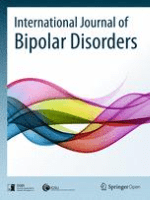
BIPOLAR DISORDERS
Scope & Guideline
Fostering Breakthroughs in Bipolar Research
Introduction
Aims and Scopes
- Research on clinical characteristics and treatment outcomes:
The journal focuses on empirical studies that investigate the clinical features of bipolar disorder, including treatment efficacy, side effects, and long-term outcomes of various therapeutic interventions. - Exploration of neurobiological mechanisms:
Papers often delve into the neurobiological underpinnings of bipolar disorder, examining brain structure, function, and the role of neurochemicals in mood regulation. - Psychosocial and behavioral aspects:
Research includes the psychosocial implications of bipolar disorder, exploring how social factors, lifestyle choices, and psychological therapies impact patient outcomes. - Innovative treatment approaches:
The journal features studies on novel treatment modalities, including pharmacogenetics, digital health interventions, and emerging therapies like ketamine and psilocybin. - Focus on comorbidities:
A significant body of work addresses the prevalence and management of comorbid conditions, such as anxiety disorders and substance use disorders, in individuals with bipolar disorder.
Trending and Emerging
- Digital health interventions:
There is a growing interest in the application of digital technologies, such as smartphone apps and telehealth, to enhance monitoring and treatment adherence in bipolar disorder. - Psychedelic-assisted therapies:
Research into psychedelics, particularly psilocybin and ketamine, is trending as a novel approach for treatment-resistant bipolar depression, signaling a shift towards exploring alternative therapeutic options. - Neuroimaging and biomarker studies:
Emerging studies focus on using neuroimaging techniques and biomarkers to understand the neurobiological bases of bipolar disorder, aiding in diagnosis and personalized treatment. - Integrated care models:
There is an increasing emphasis on integrated care approaches that combine pharmacological and psychosocial interventions, reflecting a holistic view of managing bipolar disorder. - Research on social determinants of health:
Investigations into how social factors, such as socioeconomic status and community resources, impact the management and outcomes of bipolar disorder are gaining prominence.
Declining or Waning
- Historical perspectives on treatment:
There has been a noticeable reduction in papers focusing on historical treatment methods and perspectives, possibly as the field shifts towards more contemporary and evidence-based practices. - Genetic studies of bipolar disorder:
Although genetic research remains important, there seems to be a waning interest in genetic association studies as more researchers gravitate towards functional and mechanistic studies. - Basic science research:
There is a decline in the number of studies purely focused on basic science aspects of bipolar disorder, as the journal increasingly emphasizes translational research and clinical applications. - Longitudinal studies of childhood-onset bipolar disorder:
Research specifically targeting childhood-onset bipolar disorder has decreased, possibly due to the complexities and evolving definitions of the disorder in younger populations. - Descriptive epidemiological studies:
While foundational, descriptive studies exploring the epidemiology of bipolar disorder have seen a decline, likely overshadowed by more sophisticated analytical methods that focus on specific interventions and outcomes.
Similar Journals

INTERNATIONAL JOURNAL OF PSYCHIATRY IN MEDICINE
Bridging Mental Health and Medical PracticeINTERNATIONAL JOURNAL OF PSYCHIATRY IN MEDICINE is a distinguished publication dedicated to advancing the understanding of psychiatric practice and mental health issues within a medical framework. Published by SAGE PUBLICATIONS INC, this journal has been a trusted source in the field since its inception, with its archives dating back to 1973. It offers a comprehensive exploration of psychiatric research, clinical studies, and theoretical advancements that seek to bridge the gap between psychiatry and general medicine. With an impact factor reflective of its quality and relevance, categorized in the Q3 quartile in Psychiatry and Mental Health, this journal stands as a vital resource for researchers, clinicians, and students alike. Although operating on a traditional subscription model, the extensive knowledge shared within its pages contributes significantly to ongoing discussions in psychiatric and mental health education and practice. As the field continually evolves, the INTERNATIONAL JOURNAL OF PSYCHIATRY IN MEDICINE remains committed to fostering innovative and impactful scholarship that resonates with professionals navigating the complexities of mental health in clinical contexts.

PSYCHIATRY RESEARCH
Fostering collaboration in the pursuit of mental health excellence.PSYCHIATRY RESEARCH is a leading journal published by Elsevier Ireland Ltd, dedicated to advancing the field of psychiatry and mental health through the dissemination of rigorous research. With an impressive impact factor and categorized in the top quartile (Q1) of both Biological Psychiatry and Psychiatry and Mental Health in 2023, this journal ranks 14th in the field of Medicine _ Psychiatry and Mental Health out of 567 journals, and 4th in Neuroscience _ Biological Psychiatry out of 51, showcasing its influence and quality. Since its inception in 1979, PSYCHIATRY RESEARCH has provided a platform for innovative studies, clinical trials, and comprehensive reviews aimed at understanding the complexities of mental health disorders. Although it operates under a traditional access model, the journal remains committed to making vital research available to the academic community, ensuring that both seasoned professionals and budding researchers have access to groundbreaking findings. Positioned as a hub for psychiatric research, it caters to a diverse audience including clinicians, psychologists, and students, empowering them to contribute to the evolving landscape of mental health care.

Parkinsons Disease
Unlocking insights for a brighter future in neurology.Parkinson's Disease is a prestigious open access journal dedicated to advancing the field of neurology with a special emphasis on Parkinson's disease and related movement disorders. Published by Hindawi Ltd, the journal has established itself as a vital resource since its inception in 2008, transitioning to an open access model in 2010. Featuring the ISSN 2090-8083 and E-ISSN 2042-0080, it has rapidly gained traction in the academic community, currently ranked Q2 in clinical neurology and psychiatry in the 2023 category quartiles, highlighting its significance and quality within the field. With Scopus rankings placing it in the top percentiles for neuroscience and psychiatry, it provides researchers, healthcare professionals, and students with cutting-edge research, reviews, and clinical studies. Situated in London, England, this journal encourages submissions that contribute to the understanding and management of Parkinson's disease, showcasing the latest findings and fostering collaboration among researchers worldwide.

Brazilian Journal of Psychiatry
Fostering excellence in psychiatry for a global audience.The Brazilian Journal of Psychiatry is a prominent peer-reviewed journal dedicated to advancing the field of psychiatry and mental health, published by the Associação Brasileira de Psiquiatria. With an impressive Q2 ranking in the Psychiatry and Mental Health category for 2023 and a Scopus rank of #130 out of 567, this journal serves as a vital resource for researchers, clinicians, and students alike. Since its transition to Open Access in 1999, it has aimed to disseminate high-quality research, innovative practices, and critical insights relevant to mental health in Brazil and beyond. The journal's focus spans various topics in psychiatry, aiming to bridge the gap between research and clinical application, making it essential reading for professionals and academicians committed to improving mental health outcomes. With a commitment to fostering scholarly discourse, the Brazilian Journal of Psychiatry not only enriches the academic landscape but also enhances the practice of psychiatry through its widespread accessibility and dedication to excellence in research.

International Journal of Bipolar Disorders
Pioneering Open Access for Bipolar InsightsThe International Journal of Bipolar Disorders, published by SPRINGER, is a leading Open Access journal dedicated to advancing the understanding of bipolar disorders and mental health issues. With an impressive impact factor and categorized in the Q2 quartile for Biological Psychiatry and the Q1 quartile for Psychiatry and Mental Health, this journal plays a pivotal role in disseminating high-quality research in these critical fields. Since its inception in 2013, the journal has become a vital resource for researchers and practitioners alike, providing open access to original research, reviews, and case studies, promoting a comprehensive understanding of the complexities surrounding bipolar disorders. The Scopus ranking highlights its relevance and contribution to the field, placing it in the top percentile among its peers. Based in Germany and operating with an emphasis on accessibility, the journal is committed to enriching the discourse on bipolar disorders and fostering collaboration among mental health professionals worldwide.

Middle East Current Psychiatry-MECPsych
Exploring the intersection of culture and psychiatry.Middle East Current Psychiatry (MECPsych), published by SpringerNature, is a prominent open-access journal dedicated to advancing the field of psychiatry and mental health in the Middle East and beyond. Since its establishment in 2011, MECPsych has aimed to disseminate high-quality research, reviews, and reports that capture recent developments in psychiatric science, clinical practice, and public health considerations in mental well-being. With an impact factor reflective of its growing influence and classified in the Q3 quartile for Psychiatry and Mental Health, the journal offers invaluable insights backed by rigorous peer review processes. Operating under an open access model since 2019, MECPsych ensures that its articles are freely accessible to a global readership, enhancing the visibility and application of research findings. As part of its ongoing commitment to enriching understanding in the field, MECPsych also encourages submissions that explore the unique cultural, societal, and economic factors influencing mental health across the region. This approach not only supports researchers, professionals, and students in their pursuit of knowledge but also fosters a collaborative dialogue among mental health stakeholders in the Middle East and around the world.

PSYCHIATRIC GENETICS
Innovating Research at the Crossroads of Genetics and PsychiatryPSYCHIATRIC GENETICS, published by LIPPINCOTT WILLIAMS & WILKINS, is a pivotal journal dedicated to the interdisciplinary study of genetic factors in psychiatric disorders, bridging the fields of genetics, psychiatry, and neuroscience. With a commitment to advancing research from its inception in 1990 and continuing through 2024, the journal provides a platform for innovative studies and findings that explore the genetic underpinnings of mental health. Although not currently an Open Access publication, it reaches a wide audience concerned with the complex interplay between genetics and psychiatric conditions, contributing to its Q3 and Q2 quartile rankings across multiple relevant categories in 2023. The importance of this journal cannot be understated; it serves as a crucial resource for researchers, clinicians, and students eager to uncover insights that could lead to more effective interventions and treatments in the realm of mental health.

BEHAVIOR THERAPY
Exploring New Frontiers in Psychological TreatmentBehavior Therapy, published by Elsevier Inc, is a premier journal in the field of Clinical Psychology, recognized for its significant contributions to the empirical understanding and practical application of behavior therapy interventions. With an impressive impact factor ranking it in the Q1 quartile of Clinical Psychology as of 2023, and a commendable position in the 87th percentile among its peers, this journal serves as a vital resource for researchers, practitioners, and students alike. Since its inception in 1970, Behavior Therapy has dedicated itself to publishing high-quality original research, comprehensive reviews, and insightful case studies that cover the latest advancements in treatment modalities and behavioral interventions. The journal is committed to fostering a deeper understanding of psychological processes and therapeutic techniques, making it an essential platform for innovative ideas and effective practices in the realm of behavior therapy.

AMERICAN JOURNAL OF DRUG AND ALCOHOL ABUSE
Pioneering Research in Substance Abuse and Mental HealthAmerican Journal of Drug and Alcohol Abuse is a highly regarded publication in the field of substance abuse research, published by Taylor & Francis Inc. With its inception in 1974, this journal has become an essential resource for scholars and practitioners interested in clinical psychology, psychiatry, and the multifaceted issues surrounding drug and alcohol use. It holds a notable Q2 ranking in Clinical Psychology, Medicine (miscellaneous), and Psychiatry and Mental Health, emphasizing its impact and relevance in these domains. The journal's 2023 Scopus rankings further highlight its standing, placing it in the top quartile of publications with established readership and citation metrics. Researchers and students can benefit from its comprehensive articles that delve into the complexities of substance use, treatment methodologies, and the socio-psychological underpinnings of addiction. Whether you seek to access cutting-edge studies or contribute to ongoing discourse in the field, the American Journal of Drug and Alcohol Abuse serves as a vital hub for knowledge dissemination and scholarly engagement.

ACTA NEUROPSYCHIATRICA
Championing Excellence in Neuropsychiatric ResearchACTA NEUROPSYCHIATRICA is a distinguished journal published by Cambridge University Press, covering essential research across the fields of psychiatry and neuroscience. Since its inception in 1989, it has become a pivotal resource for researchers and clinicians, providing a platform for the latest advancements and insights in biological psychiatry. With an impressive Scopus rank of #66 out of 567 in the Psychiatry and Mental Health category, and #10 out of 51 in Biological Psychiatry, the journal is recognized for its significant contributions to the field, boasting an 88th percentile ranking in overall impact. Although it operates under a traditional access model, the journal remains committed to disseminating high-quality research that addresses critical issues in mental health. Whether you are a professional seeking the latest findings or a student aiming to deepen your knowledge, ACTA NEUROPSYCHIATRICA is an indispensable resource for cutting-edge developments that shape our understanding of the human mind.